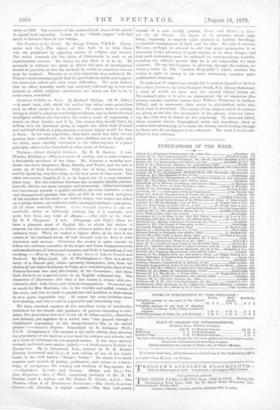Novets.—Great Grenfell Gardens. By B. H. Buxton. 3 vole, (Tinsley
Brothers.)—This is a novel of society, and in some respects a favourable specimen of the class. Mr. Norman, a wealthy mer- chant, has three daughters, Mary, Estella, and Nettie, and the tale is made np of their love-stories. Only one of them, however, hag, strictly speaking, any love-story, in the true sense of that word. The other two marry, happily, it is to be hoped, but in a very common- place way. But the relations between the romantic Estella and her hero, St. Helier, are more complex and interesting. Other personages are introduced, notably a genial swindler, by name Latimer ; a sour and disappointed spinster, who acts as foil to the youth and grace of the heroines of the story ; an Italian singer, who makes her dant as a prima donna; an authoress with a scampish husband ; and others, all of them naturally drawn. Great Grenfell Gardens is not re- markably clever or brilliantly written, but it is readable, and quite free from any kind of offence.—The Gift of the Gods. By M. F. Chapman. 2 vols. (Chapman and Hall.)—Hore we have a pleasant story of English life, in which the author is content, for the most part, to follow common paths, and to keep an ordinary level. When he makes a higher effort, as he does in the return of the husband whom all had thought lost, ho does it with discretion and success. Otherwise the reader is quite content to follow the ordinary narrative of the hopes and fears, disappointments and satisfactions, of heroes and heroines, and finds it interesting, if not exciting.— Won by Waiting : a Home Story of Life in France and England. By Edna Lyall. (H. B. Whittingham,)—This is a pretty story of a French girl, whom necessity transplants, first, from the shelter of her father's chAteau to Paris, as it was daring the days of the Franco-German war and, afterwards, of the Commune ; and then, from Paris to an ungenial home in an English cathedral city. The character of Esperanee (for that is her name) is drawn with con- siderable skill, with force, and without exaggeration. We cannot say so much for Mrs. Mortlake, who is the worldly and selfish woman of the story, and who is made to parade her bad qualities in what seems to us a quite imposaible way. Of course the story includes some love-making, and this is told in a graceful and interesting way.


































 Previous page
Previous page